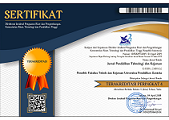Evaluasi Kinerja Metode PCA/LPP Pada Sistem Pengenalan Citra Wajah Manusia
DOI:
https://doi.org/10.23887/jptk-undiksha.v6i1.17Abstract
Sistem identifikasi personal yang berbasis pengenalan wajahdengan tingkat akurasi yang optimal sangat diperlukan untuk
mengidentifikasi seseorang secara tepat yang dapat dimanfaatkan dalam suatu sistem pengamanan elektronik. Pada penelitian ini telah dibangun suatu sistem pengenalan citra wajah manusia dengan menerapkan dua metode pada tahap ekstraksi ciri wajah, yaitu metode Principal Component Analysis (PCA) digabung dengan metode Locality Preserving
Projection (LPP) atau yang akan disebut dengan metode PCA/LPP. Sedangkan pada tahap pengklasifikasian digunakan metode linier yaitu jarak euclidean dari ketetanggaan terdekat. PCA digunakan untuk mereduksi dimensi citra wajah yang besar dengan vektor basis yang disebut Eigenfaces. Sedangkan metode Locality Preserving Projection merupakan metode linier yang dapat menemukan manifold nonlinier data pada dimensi rendah. Vektor-vektor basis yang dihasilkan LPP disebut
Laplacianfaces. Untuk tahap uji coba sistem, digunakan basis data wajah Yale yang telah dinormalisasi. Tingkat pengenalan optimal yang diperoleh dengan menggunakan metode PCA adalah 82.67%, sedangkan dengan metode PCA/LPP adalah 86.67%.
Kata-kata kunci : PCA, LPP, Eigenfaces, Laplacianfaces
Downloads
Published
2009-02-23
Issue
Section
JPTK
License
Authors who publish with the JPTK agree to the following terms:- Authors retain copyright and grant the journal the right of first publication with the work simultaneously licensed under a Creative Commons Attribution License (CC BY-SA 4.0) that allows others to share the work with an acknowledgment of the work's authorship and initial publication in this journal
- Authors are able to enter into separate, additional contractual arrangements for the non-exclusive distribution of the journal's published version of the work (e.g., post it to an institutional repository or publish it in a book), with an acknowledgment of its initial publication in this journal.
- Authors are permitted and encouraged to post their work online (e.g., in institutional repositories or on their website) prior to and during the submission process, as it can lead to productive exchanges, as well as earlier and greater citation of published work. (See The Effect of Open Access)











